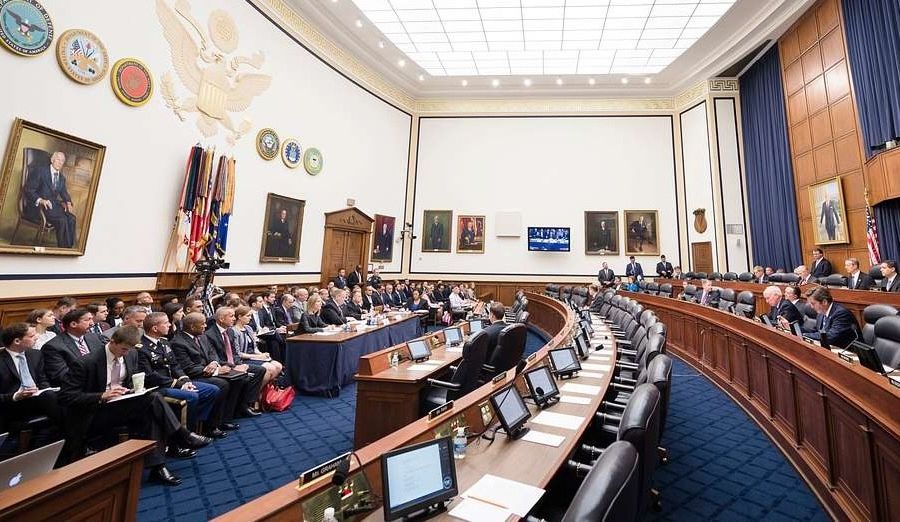At a House Foreign Affairs Subcommittee hearing on Thursday, witnesses proposed confronting Iran directly by deploying more military capabilities to the Middle East and the authorization of the use of force.
Yet, they conveniently neglected to mention that their employers — which included one Pentagon contractor and several think tanks funded by weapons manufacturers — stand to rake in profits from selling Congress on a military-first approach to Iran.
One of the witnesses of the hearing — billed as “Israel and the Middle East at a Crossroads: How Tehran’s Terror Campaigns Threatens the U.S. and our Allies” — was Kirsten Fontenrose. Fontenrose, a former Trump administration official, testified that the U.S. should pass an Authorization for the Use of Military Force (AUMF), an open-ended congressional resolution that would authorize the president to engage in military action against Iran.
“The U.S. should make it clear to the leadership of Iran’s proxy, drone and missile programs that new capabilities now permit the U.S. and partners to dismantle their facilities and chains of command with low to no risk of negative secondary effects," she said. "Though ‘AUMF’ is a four letter word in Congress, an Authorized Use of Military Force could convey this quickly and clearly.”
Fontenrose is the President of Red Six Solutions, a red team defense consulting company and Pentagon contractor that prepares clients for threats against unmanned aerial systems. Its website boasts that its “pilot services include UAS operations, training, airspace coordination, event planning, and data generation with all types of UAS to include swarm, large-scale and turbine aircraft.”
According to one of Red Six’s partners, the company has explicitly prepared clients to combat threats from Iran.
Fontenrose is also a non-resident fellow at the Atlantic Council. In a financial conflict of interest document submitted to the subcommittee, Fontenrose disclosed a grant from Norway to the Atlantic Council. Yet, she did not mention the think tank’s funding from Gulf countries, despite being required to list all foreign government contributions related to the hearing’s content. Through embassies and state-owned companies, the UAE and Saudi Arabia (both have had an adversarial relations with Iran) contributed over $3 million and $300,000 respectively to the Atlantic Council over the past two years based on a review of annual reports.
Elliott Abrams, who was convicted of lying to Congress during the Iran-Contra affair, is back on Capitol Hill testifying on — of all things — Iran. During the hearing, Abrams testified that “we have too often been guided by fear of Iran, and have restrained the ability of both our own CENTCOM forces and of our ally Israel in responding to Iranian attacks. It's past time to put those fears behind us.”
Abrams argued we should take “military moves that suggest to Iran we’re serious, for example having the force structure there.” Abrams is a Senior Fellow at the Council on Foreign Relations, which accepted at least $750,000 from major Pentagon contractors in the past two years.
Jonathan Lord, a Senior Fellow at the Center for a New American Security, praised the Biden administration’s decision to send aircraft carriers to the region to deter Iran: “The presence of two carrier strike groups, and not only that but the messaging about all the stealth capabilities, F-35s, F-22s, a guided missile destroyer, these are first strike capabilities and obviously it’s not going to get talked about publicly, but I’m fairly convinced that Iran was put on notice and President Biden had his hand on the holster and made it very clear: deterrence can be effective.”
The Center for a New American Security, received over $2.5 million in contributions from major Pentagon contractors in the last two years. This included at least $1,000,000 from Northrop Grumman, $350,000 from Lockheed Martin, and $100,000 from BAE Systems, the manufacturers of the F-35.
CNAS spokesperson David McKenzie told RS that CNAS "accepts funds from a broad range of sources provided they are for purposes that are in keeping with its mission" and provided a link to its funders and intellectual independence policy.
Red Six Solutions and Council on Foreign Relations did not immediately respond to a request for comment.
At the end of the hearing, Lord noted plenty of consensus on the panel towards a more confrontational approach with Iran. “If you look across the recommendations in our testimonies, there is a lot of shared thinking here.”
Of course there is. In the past two sessions of Congress alone, think tanks funded by Pentagon contractors sent at least 60 people to testify to the House of Representatives. As long as witnesses funded by private defense companies continue to dominate the witness table, there will always be a consensus projected in favor of using military force.
- New report shows more than $1B from war industry and govt. going to top 50 think tanks ›
- When 80 percent of US generals go to work for arms makers ›
















